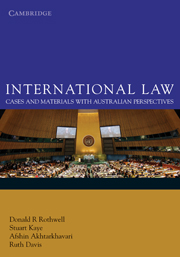Book contents
- Frontmatter
- Contents
- Preface
- About the authors
- Acknowledgements
- Table of cases
- Table of statutes
- Table of treaties and other international instruments
- Abbreviations
- 1 The nature of international law
- 2 Sources of international law
- 3 Law of treaties
- 4 International and municipal law
- 5 International legal personality
- 6 Sovereignty over territory
- 7 Jurisdiction
- 8 State responsibility
- 9 Human rights
- 10 Law of the sea
- 11 International environmental law
- 12 Enforcement of international law
- 13 The peaceful settlement of international disputes
- Index
- References
9 - Human rights
- Frontmatter
- Contents
- Preface
- About the authors
- Acknowledgements
- Table of cases
- Table of statutes
- Table of treaties and other international instruments
- Abbreviations
- 1 The nature of international law
- 2 Sources of international law
- 3 Law of treaties
- 4 International and municipal law
- 5 International legal personality
- 6 Sovereignty over territory
- 7 Jurisdiction
- 8 State responsibility
- 9 Human rights
- 10 Law of the sea
- 11 International environmental law
- 12 Enforcement of international law
- 13 The peaceful settlement of international disputes
- Index
- References
Summary
Introduction
In the 19th century international law did not concern itself with protecting the gamut of political, civil, economic, social and group interests and rights which are important in the 20th century. Individuals were protected in a limited number of cases such as piracy, slavery, treatment of sick and wounded soldiers, and prisoners of war. The dominance of the concept of sovereignty precluded any State or institution from using international law to intervene in the domestic affairs and jurisdiction of a State. In 1905 when Lassa Oppenheim published his first edition of International Law, considered to be one of the most significant English-language treatises on the subject, he stated that the rights of man were not a part of international law.
The end of World War I started an important shift towards the idea that groups of individuals had to be protected. The League of Nations in 1919 focused on groups and minorities in particular. Article 22 of the 1919 Covenant of the League of Nations established rudimentary provisions for the self-determination of people who, because of war, had stopped being governed by their own State. It included an obligation on the part of the Mandatory Powers acting on behalf of the League to guarantee the freedom of conscience and religion. The Treaty of Versailles in Part XIII established the International Labour Organization (ILO) to support the rights of individuals to associate and promote better standards of working conditions.
- Type
- Chapter
- Information
- International LawCases and Materials with Australian Perspectives, pp. 444 - 500Publisher: Cambridge University PressPrint publication year: 2010



